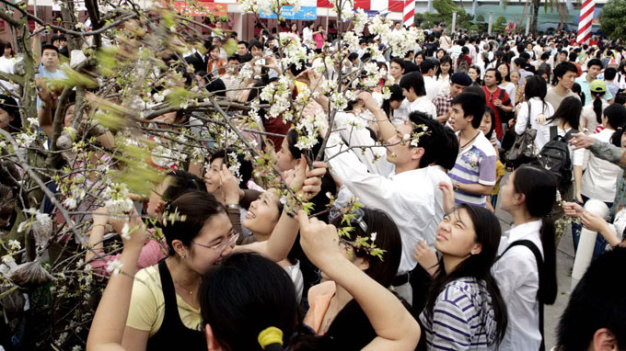Some culture researchers, linguists, photographers and writers who were born, grew up in or have spent a large chunk of their life in Hanoi have shared their opinions on how to build a capital free of foul language and uncultured behavior, which have become topical recently.
>> An audio version of the story is available here
The capital’s administration has requested that relevant agencies work to clean up language among its citizens by taking measures meant to minimize the use of foul language and uncultured behavior at school and in society.
The move followed a number of cases in which foul-mouthed youngsters, students and celebrities were caught using vulgar language in public, according to the Hanoi administration.
In late 2014, the municipal administration also tasked the Department of Culture, Sports and Tourism with collecting feedback from the public to develop a code of conduct to be applied in public offices and residential communities.
The set of rules was then scheduled to be issued this year.
Some experts and cultural authorities told Tuoi Tre (Youth) newspaper about their nostalgia for the Hanoi of the past, which prides itself on millennium-old civilization and culture, and efforts to revive such a sophisticated, elegant lifestyle among its residents.
Veteran photographer Quang Phung has lived in and bonded with Hanoi for almost a century, since he was one year old.
He has roamed the city’s every nook and cranny and sometimes spent hours taking snapshots of modern-time Hanoi residents’ lifestyle.
“As far as I have observed, Hanoi has suffered a worrying linguistic disorder, particularly since 1975. I often hang around schools and catch students using foul language anywhere,” Phung said.
Most families in the old Hanoi, including his own, taught their children to be well-mannered, elegant people.
With such cultivation of decent manners, children grew up into tolerant, refined adults.
“I did not see Hanoi people swear or call one another names during the warring years or the poverty-stricken ‘subsidy’ years that ensued. Vulgar language only gained in frequency and quantity when the country’s economy picked up,” the photographer observed, referring to the time when the government subsidized everything in the country.
Phung also put the endemic ill manners down to the limited number of genuine Hanoi people among the city’s current population of approximately seven million.
In 1954, influxes of Hanoians migrated to the south.
After 1975, a number of people in Saigon (now Ho Chi Minh City), including migrants from Hanoi, settled in other countries.
These migrants originally from Hanoi have been looked up to by natives in those countries for their talent and refined manners, Phung said.
Meanwhile, some millions of people in today’s Hanoi come from rural areas of other provinces to eke out a living amidst the capital’s hustle and bustle.
“They are already worn out from providing for themselves and their families. So why bother about cultured manners?”
Unlike in many countries, local universities have yet to offer courses on tactful manners.
Seasoned writer/artist Do Phan was also nostalgic about a sophisticated Hanoi in the past.
“Apart from administrative measures, there’re simpler ways to raise people’s awareness against being potty-mouthed. One such way includes making small signs that read ‘Please watch your mouth.’ Such signs can be attached to buses to start with,” he urged.
In a similar vein, Dr. Trinh Hoa Binh, director of the Center for Public Opinion Studies under the Vietnam Institute of Sociology, stressed that if people are properly educated, they would be highly immune to the adverse effects of Hanoi getting geologically larger and teeming with migrants.
“Apart from a code of conduct, it would take large-scale social campaign efforts which orient the community toward such civilization values as integrity, fairness and good manners,” he stressed.
“Better social control is of the essence, besides education by families and schools.”
Dr. Binh observed that foul-mouthed people are not found only in Hanoi.
“However, the vulgar language uttered by those in the southern region to vent their frustration or anger is more acceptable than that adopted by their Hanoi counterparts, many of whom tend to do so just to put on their easygoing, outspoken manners.”
Likewise, Associate Professor Pham Van Tinh, secretary general of the Vietnam Linguistics Association, pointed out that migrant workers’ everyday language has diversified the polished one used by old-time Hanoians.
However, many young people these days tend to mix up how they use their language in different contexts, which results in inappropriateness.
“It would take community awareness and social pressure to force citizens into adjusting their manners and choice of language,” Assoc. Prof. Tinh said.
“Whether the manner rectification document by the city’s administration would achieve desirable results or not depends on how the competent agencies implement it and how the community will react.”
Culture researcher Giang Quan attributed the rampant use of vulgar language to rapid urbanization and urban expansion, which has left little time to cultivate good behavior among migrants.
“Such an education task cannot be done overnight,” he concluded.
Like us on Facebook or follow us on Twitter to get the latest news about Vietnam!






















































